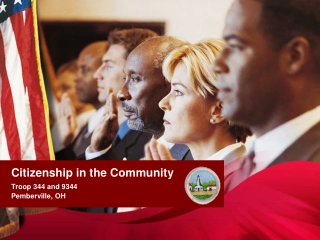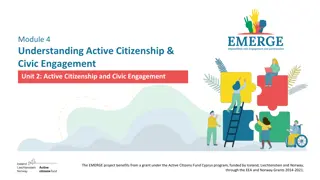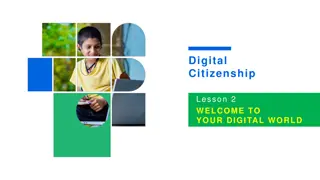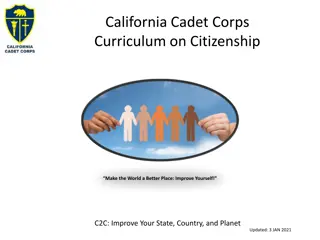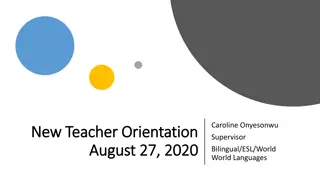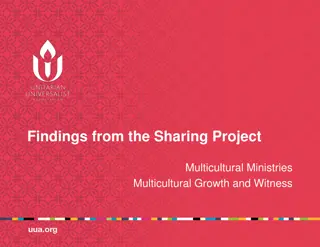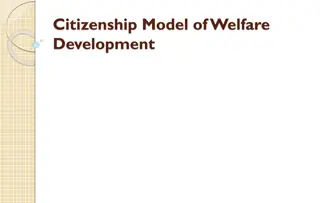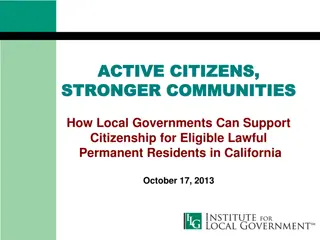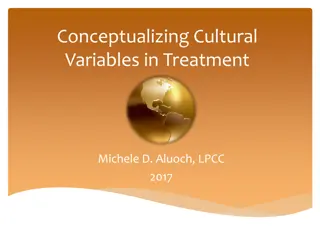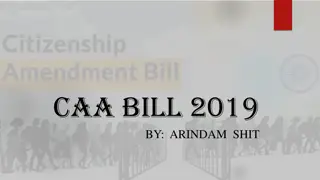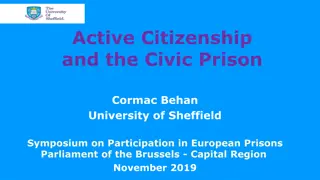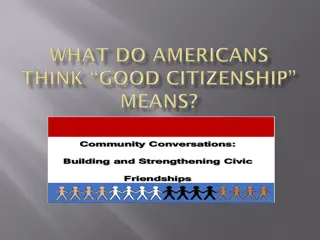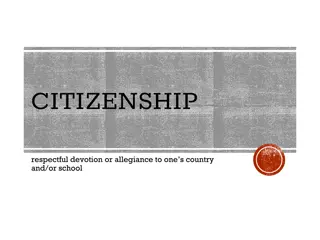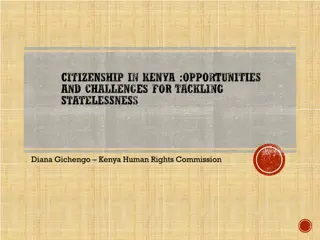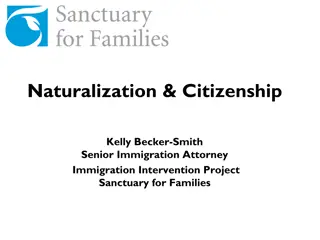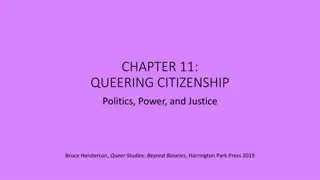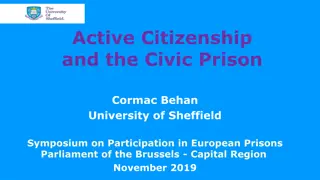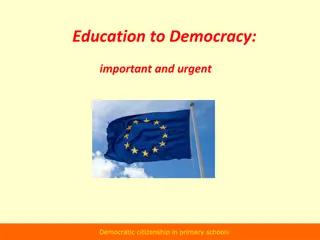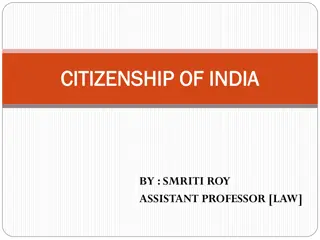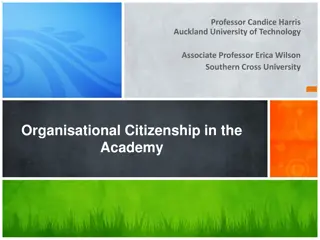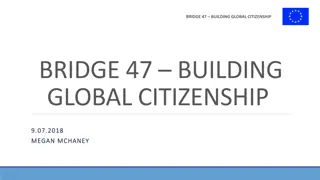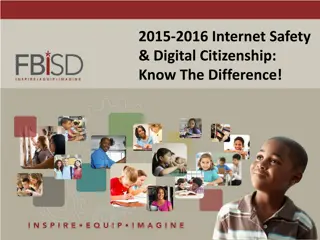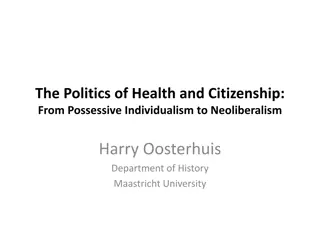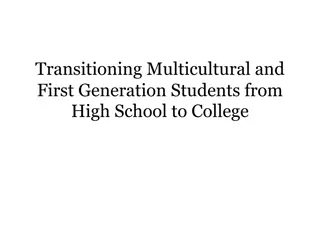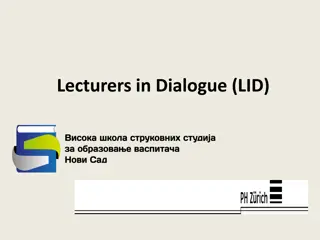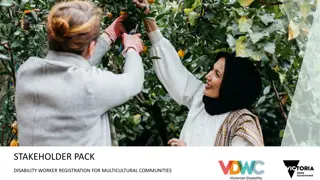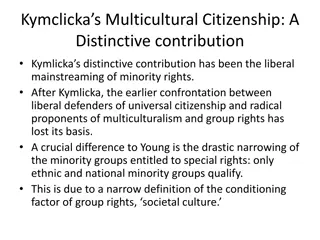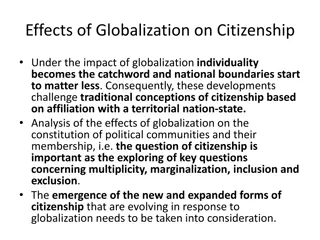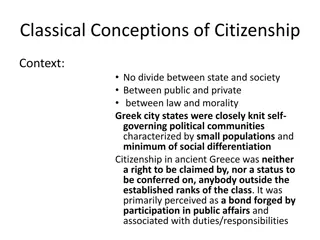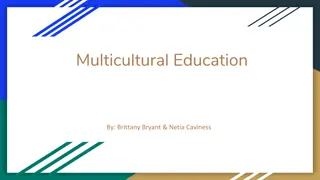Citizenship in the Community Merit Badge Requirements
Explore the Citizenship in the Community Merit Badge requirements focusing on understanding the rights, duties, and obligations of being a good citizen in your community. From discussing what citizenship means to volunteering at charitable organizations, this badge encourages active participation in
0 views • 45 slides
Developing Good Citizenship Values among Citizens by Citizenship Education Team
Good citizenship entails obeying laws, fostering civic intelligence, responsibility, and participation, being active in governance, showing cooperation, self-control, law obedience, loving one's country, and promoting unity to build a better society. These qualities are nurtured through civic educat
6 views • 15 slides
Impact of Communication Styles on Counseling and Social Work in Multicultural Settings
Exploring the influence of communication styles on counseling and social work in diverse cultural contexts, this study delves into the nuances of verbal and nonverbal communication, including proxemics, kinesics, and paralanguage. It highlights the importance of adapting interventions to align with
0 views • 18 slides
Understanding Active Citizenship & Civic Engagement: Definitions and Importance
Encouraging citizens and organizations to actively participate in civil society and decision-making processes is vital for a democratic society. Active citizenship involves participation in public affairs, civil society, and political life with a focus on human rights, democracy, and community well-
1 views • 22 slides
Effects of Globalization on Citizenship: A Critical Analysis
Under the impact of globalization, traditional conceptions of citizenship based on national boundaries are being challenged, leading to the emergence of new forms of citizenship. Globalization questions the authority of nation-states over citizenship and democracy, highlighting the interconnectednes
0 views • 14 slides
Ancient Greek Conceptions of Citizenship by Aristotle
Ancient Greek conceptions of citizenship, as discussed by Aristotle, emphasized the close-knit nature of city-states, where citizenship was a bond forged by active participation in public affairs. Citizenship was viewed as a privilege, exclusive in nature, with a strong emphasis on civic virtue, tru
0 views • 9 slides
Critique of Universal and Differentiated Citizenship
Universal citizenship embodies equality of rights for all citizens, while differentiated citizenship focuses on special representation rights for oppressed groups. Iris Marion Young criticizes the universalism in citizenship, advocating for differentiated citizenship to address the needs of marginal
2 views • 10 slides
Aristotle's Justification of Hierarchy and Republican Aspects of Citizenship
Aristotle's concept of citizenship involves a hierarchical structure where ruling and being ruled in turn is essential. He justifies this hierarchy by emphasizing the advantageous nature of ruling and being ruled. However, his views on citizenship in Greek city-states were limited to adult males, hi
4 views • 6 slides
Evolution of Citizenship in Liberal Democracy
Citizenship within liberal democracy entails equal rights, duties, liberties, and constraints for individuals within a political community. The entrenchment of civil and political rights has shaped the struggle for membership and participation in political communities. Civil rights, essential for in
1 views • 11 slides
Understanding Your Digital World: An Introductory Lesson on Digital Citizenship
Explore the fundamentals of digital citizenship in Lesson 2 of this engaging course. Uncover the ins and outs of computers, computing devices, input-output processes, and essential terminology. Dive into the significance of computers in the realm of digital citizenship and get hands-on guidance on w
2 views • 16 slides
California Cadet Corps Curriculum on Citizenship - Make the World a Better Place!
In the California Cadet Corps Curriculum on Citizenship, cadets learn about active citizenship and how to improve their state, country, and planet. The unit objectives focus on defining active citizenship, understanding rights and responsibilities, volunteering effectively, and more. Active citizens
0 views • 39 slides
New Teacher Orientation - Supporting Multicultural Education and English Language Learners
The new teacher orientation session led by Supervisor Caroline Onyesonwu on August 27, 2020, focused on supporting multicultural education and English Language Learners (ELLs). The agenda included activities like exploring one's multicultural self, discussing ELL student placement and language profi
1 views • 18 slides
Evolution of Liberal Citizenship Theory
The liberal theory of citizenship emphasizes the essential components of right, responsibility, and identity within a political community. It contrasts with pre-capitalist societies by offering a weak sense of membership and reduced citizen obligations. The addition of social rights has brought an e
0 views • 15 slides
Insights from Multicultural Ministry Growth Survey
Findings from the Sharing Project Multicultural Ministries reveal data and insights gathered from Unitarian Universalists historically marginalized by different factors, aiming to understand their unique experiences, needs, and challenges within Unitarian Universalism. The survey collected 1,500 res
1 views • 21 slides
Understanding Citizenship Models and Welfare Development
Explore the concept of citizenship within the context of state development, focusing on elements such as population, territory, government, and sovereignty. Learn about the three kinds of population in a state - aliens, subjects, and citizens - and how they differ in terms of rights. Discover the Ci
3 views • 10 slides
Supporting Local Government Initiatives for Citizenship in California
Learn how local governments in California can support lawful permanent residents in their citizenship journey and promote stronger communities. This includes tips on engaging residents, understanding citizenship processes, and building partnerships with federal agencies and community organizations.
0 views • 44 slides
Understanding Cultural Variables in Treatment: A Multicultural Perspective
This content explores the significance of cultural variables in treatment, emphasizing the importance of multicultural competence for counselors. It covers defining multicultural aspects, key personality attributes for multicultural competency, risks of lacking multicultural competence, and differen
0 views • 212 slides
Overview of Citizenship Amendment Act, 2019
The Citizenship Amendment Act, 2019 aims to provide Indian citizenship to illegal refugees belonging to six communities from Pakistan, Bangladesh, and Afghanistan. It reduces the residency requirement for acquiring citizenship to 5 years and allows for identification and potential deportation of ill
0 views • 8 slides
Reimagining Citizenship in Prison: Active Civic Engagement and Rights
Explore the intersection of citizenship and incarceration, focusing on the concept of active citizenship within prison settings. Delve into the importance of civic engagement, prisoner rights, and the evolving mosaic of citizenship, highlighting avenues for volunteering, accountability, and reintegr
2 views • 16 slides
Understanding Citizenship Through Aristotle's Four Aspects
Aristotle's concept of citizenship involves balancing individual autonomy, participation in public affairs, state authority, and social relations. A 2004 survey explored different dimensions of citizenship like participation, autonomy, adherence to social order, and solidarity. The data from the sur
0 views • 15 slides
Understanding Citizenship: A Shared Identity and History
Explore the diverse perspectives on citizenship through respectful devotion to one's country or school. Discover what citizenship means to individuals in just six words and how it ties into shared histories and identities. Delve into the American Dream and the shared privilege it represents, emphasi
0 views • 18 slides
Understanding Citizenship and Immigration in Modern Democracies
Citizenship, a fundamental institution of modern democracies, defines the relationship between individuals and the state through reciprocal rights and duties. However, citizenship has a dual nature, serving to both include certain individuals as citizens and exclude others. Immigrants residing withi
0 views • 21 slides
Understanding Citizenship in Kenya: Opportunities and Challenges
Exploring the acquisition of Kenyan citizenship through birth and registration, including eligibility criteria, processes, and implications. The article delves into citizenship by birth, registration, marriage, and special cases like children of Kenyan citizens by registration, shedding light on the
0 views • 17 slides
Complete Guide to US Citizenship and Naturalization Process
Discover essential information on US citizenship and the naturalization process, including common acronyms, ways to obtain citizenship, benefits of becoming a US citizen, steps to apply for naturalization, and key details about the N-400 form. Learn about the significant advantages of US citizenship
0 views • 49 slides
Exploring Queer Citizenship and Critical Perspectives on Naturalization
Delve into the complexities of queer citizenship through a critical lens, discussing the evolving definitions of citizenship, the impact of naturalization on different racial groups, and examples of denaturalization based on sexual orientation and gender identity. The concept of the public sphere is
0 views • 46 slides
Exploring Active Citizenship and Inmate Rights in European Prisons
Delve into the importance of active citizenship within prison systems, focusing on the civic engagement of inmates and their access to civil, political, and social rights. Discussions cover the evolution of citizenship concepts over centuries, the challenges faced by prisoners in maintaining their a
0 views • 16 slides
Importance of Democratic Citizenship Education in Primary Schools
Promoting democratic citizenship education in primary schools is essential for fostering a sense of community, conflict resolution skills, empathy, and embracing diversity among students. The curriculum focuses on themes like group cohesion, conflict resolution, communication, empathy, community par
0 views • 9 slides
Understanding Indian Citizenship Law
Indian citizenship is defined by the relationship between individuals and the state, with principles such as jus soli and jus sanguinis determining eligibility. The Indian Citizenship Act of 1955 outlines the rights and procedures for acquiring citizenship, including provisions for migrants from Pak
0 views • 23 slides
Exploring Organisational Citizenship in Academic Institutions
Understanding the concept of Organisational Citizenship and its significance in academic settings. Delve into the behaviors that go beyond regular job tasks to support colleagues and the work environment. Explore examples of Organisational Citizenship in academia and its impact on academic careers.
0 views • 14 slides
Building Global Citizenship through Bridge 47 Initiative
Galvanising global citizenship, the Bridge 47 initiative aims to mobilize civil society for global justice and poverty eradication. Through global citizenship education, it seeks to foster an understanding of our interconnected world and empower individuals for transformative change. Emphasizing ret
0 views • 10 slides
Internet Safety and Digital Citizenship Guidelines for Students and Parents
Understand the importance of Internet safety and digital citizenship in schools, mandated by the FCC to comply with CIPA requirements. Learn why these topics are taught at the beginning of each school year, how they are conveyed through training videos, and how students and parents are required to p
0 views • 10 slides
The Politics of Health and Citizenship: Navigating Neoliberalism
Current debates in healthcare address escalating costs, shifting citizenship dynamics, and the balance between individual autonomy and civic obligations. The concept of citizenship is historically layered and contested, with implications for public commitment and inclusion/exclusion dynamics.
0 views • 28 slides
Supporting Multicultural Student Transition from High School to College
Transitioning multicultural and first-generation students from high school to college involves addressing common concerns such as fitting in, academic challenges, social integration, and access to support services. Supporting MC students on campus through various programs, events, and partnerships i
0 views • 11 slides
Collaboration for Multicultural Education through Shadow Play
Collaboration between Zurich University of Teacher Education and Preschool Teacher Training College focused on multicultural education through shadow play. The project aims to teach social values, promote human rights and sustainable development, understand globalization, and empower teachers in uti
0 views • 11 slides
Multicultural Disability Worker Registration Communication Pack
Access key messages and communication materials in multiple languages for promoting disability worker registration within multicultural communities. The pack includes email templates, news articles, social media posts, brochures, and factsheets. Download translated versions and learn more about the
0 views • 7 slides
Kymlicka's Multicultural Citizenship: A Distinctive Contribution
Kymlicka's unique contribution lies in the mainstreaming of minority rights within a liberal framework, shifting the discourse away from the earlier confrontation between defenders of universal citizenship and proponents of multiculturalism. His focus on societal culture and the recognition of only
0 views • 14 slides
Effects of Globalization on Citizenship and Contemporary Globalization
The impact of globalization challenges traditional notions of citizenship tied to nation-states, leading to new forms of citizenship evolving in response. Globalization questions themes of citizenship, identity, and democracy, deepening the interconnectedness of local, national, and global events. F
0 views • 18 slides
Ancient Greek Citizenship and Aristotle's Views
In ancient Greece, citizenship was a bond forged through participation in public affairs, with emphasis on duties and responsibilities rather than rights. Aristotle's views on citizenship emphasized active political participation, civic virtue, and exclusivity. Citizens were those involved in the ci
0 views • 7 slides
Kymlicka's Multicultural Citizenship: A Distinctive Contribution
Kymlicka's distinctive contribution to the discourse on multicultural citizenship focuses on the liberal mainstreaming of minority rights, particularly emphasizing ethnic and national minority groups. He defines societal culture as shared history, language, and territory, excluding non-ethnic groups
0 views • 20 slides
Essential Guidelines for Implementing Multicultural Education in the Curriculum
Explore the core components of a multicultural curriculum, including delivery techniques, content considerations, teaching materials diversity, perspectives inclusion, critical inclusivity, social responsibility, and assessment strategies. Embrace various perspectives, celebrate diversity, avoid ste
0 views • 21 slides
